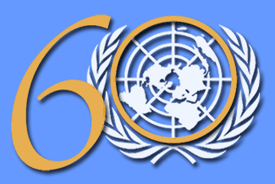The United Nations at 60 Years
A Forum on the Future of the United Nations in the 21st Century
This special conference at the University of Central Arkansas commemorates the 60th Anniversary of the official founding of the United Nations in October 1945. The conference, which is intended to bring together undergraduate students, graduate students, scholars, and citizens interested in the UN from throughout the state of Arkansas and neighboring states, will include two sessions: (a) United Nations: Past, Present, and Future; and (b) Non-Governmental Organizations, International Development, and the United Nations.
During the first (morning) session, we would encourage presentations regarding the following questions: Has the UN fulfilled the goals and objectives of its founding members? How has the UN failed to live up to its original goals and objectives? In what ways has the UN achieved its original goals and objectives? Should the UN be reformed to better reflect the prevailing structure of the international system in the 21st century? Should permanent membership of the UN Security Council be expanded? What are the pros and cons of the different UN Security Council reform proposals? What accounts for the similarities and differences among the strategies of states seeking permanent seats in the UN Security Council? Has the UN been effective in maintaining international peace and security in the past 60 years? What factors influence the success or failure of UN maintenance of international peace and security? What role should the UN play in the 21st century in terms of maintaining international peace and security? To what extent has the UN and regional-intergovernmental organizations (IGOs) cooperated in maintaining international peace and security? What is the proper role of regional IGOs in maintaining regional peace and security?
During the second (afternoon) session, we would encourage presentations of research on the following questions: What role have NGOs played in the past in terms of international development? What role should NGOs play in the future in terms of international development? What are the different strategies employed by NGOs, and what is the relative effectiveness of these different strategies? What is the relationship between NGOs and the UN in terms of international development?
Guidelines for Submitting Paper Proposals:
(1) All paper proposals should be mailed to Dr. Mark Mullenbach at 217 Irby Hall, University of Central Arkansas, Conway, Arkansas 72035. Paper proposals may also be emailed to Dr. Mark Mullenbach at markm@uca.edu.
(2) All paper proposals should include name(s) of authors, status (undergraduate student, graduate student, professor, employee of NGO, etc.). school or organization affiliation, paper title, email address, mailing address, phone number, and a short abstract or description of the paper proposal.
(3) The deadline for submitting a paper proposal is September 1, 2005. Official notification of accepted paper proposals will be emailed or mailed prior to September 8, 2005. The pre-registration deadline for the conference is September 15, 2005 (see enclosed registration form).
Format of Presentations:
(1) All panels will take place during one of two sessions (each session lasting one hour and 45 minutes), and each panel will consist of one to four papers or panelists.
(2) Each presenter or panelist will be given approximately 20 minutes (depending on the number of presenters on the panel) for the paper presentation.
(3) The remaining time will be used for questions and answers.
Best Paper Awards:
For those participants who are presenting research papers during the conference, there will be three "best paper" awards for the following categories: (1) best undergraduate student paper; (2) best graduate student paper; and (3) best non-student/faculty paper. Each "best paper" award includes a cash prize of $50.00. There will also be one "best paper-honorable mention" award for each category, including a cash prize of $25.00.
To be eligible for the "best paper" awards, the presenter must submit a draft of the paper to Dr. Mark Mullenbach by the deadline of Friday, October 7, 2005. A committee of least three individuals will judge the papers. There are no specific guidelines regarding length of the papers (10 or more pages are recommended), however, all sources of information used in the papers must be properly cited (parenthetical citations, footnotes, or endnotes are acceptable).
